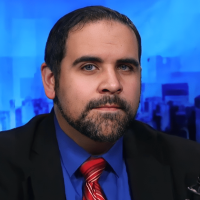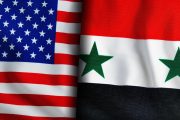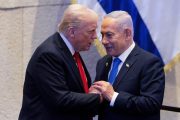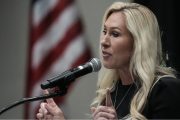This past week, the red-carpet arrival of Hu Jintao, President of the People’s Republic of China (PRC) and leader of the Chinese Communist Party (CCP), marked the beginning of the first full all-out Sino-U.S. summit in 13 years. President Hu was welcomed to the United States by Vice President Joe Biden, before the two left for the White House to meet with President Barack Obama.
The State Dinner
The center piece of Hu’s visit was the State Department summit dinner at the White House.
Relying on the exquisite expert cooking of White House Executive Chef Cristeta Comerford and Executive Pastry Chef Bill Yosses, the menu for the state dinner was composed of two appetizer dishes, three wines, a main course meal of dry-aged rib eye steak with buttermilk crisp onions and a side of double stuffed potatoes and creamed spinach, with a desert of freshly baked old fashioned apple pie and vanilla ice cream.
The American cuisine came at the request of Hu Jintao’s delegation.
In addition to the fancy meal, Presidents Obama and Hu addressed the summit state dinner with remarks about economics and human rights.
President Hu stressed the need to foster closer business ties between the U.S. and the PRC: “In the face of the complex and fluid international situation and various risks and challenges, the people of our two countries should step up cooperation.”
In a remarkable admission on the much needed progress in human rights in China, Hu stated, “China recognizes and also respects the universality of human rights,” further conceding, “a lot still needs to be done.” He went on to declare: "We will continue our efforts to promote democracy and the rule of law,” stating his willingness to further dialog with the U.S. on human rights: “We are also willing to learn from each other in terms of the good practices."
Despite the continued incarceration of Nobel Peace Prize laureate Liu Xiaobo and other political prisoners in the PRC, Obama applauded Hu’s China, stating: “There has been an evolution in China over the last 30 years. My expectation is that 30 years from now we will have seen further evolution.”
Obama then followed with more praise of the PRC, declaring,
China’s rise is potentially good for the world, to the extent that China is functioning as a responsible actor on the world stage; to the extent that we have a partner in ensuring that weapons of mass destruction don’t fall into the hands of terrorists or rogue states. That’s the kind of partnership that we’d like to see.
The dinner reception was attended by an array of high profile guests such as: former Presidents Bill Clinton and Jimmy Carter; former Secretaries of State Henry Kissinger, Madeleine Albright, and Colin Powell; Defense Sectary Robert Gates; Energy Secretary Steven Chu; Commerce Secretary Gary Locke; former Undersecretary of Commerce Ben Wu; Special Advisor to the President, Valerie Jerrett; General James E. Cartwright of the Joint Chiefs of Staff; U.S. Senators John Kerry, Mitch McConnell, and Richard Lugar; Speaker of the House John Boehner; San Francisco interim mayor Edwin Lee; Coca-Cola company CEO Muhtar Kent; media mogul Rupert Murdoch and his wife Wendi Deng; CEO toy manufacturer Charles Woo; movie star Jackie Chan; and music sensations Barbra Streisand and Quincy Jones.
Aside from Senators Kerry, McConnell, and Lugar, another senator present at the dinner was Democratic Majority Leader Harry Reid, who in a televised interview Tuesday night on Face to Face, referred to Hu Jintao as a “dictator,” telling the Las Vegas Sun‘s Jon Ralston on the program: “He is a dictator. He can do a lot of things through the form of government they have.”
Senator Reid quickly corrected himself clarifying: “Maybe I shouldn’t have said dictator, but they have a different type of government than we have, and that is an understatement.” In regard to the summit Reid said, “We have to work in the system we have — the best system ever devised to rule the affairs of man and woman. And one of the ways we get things done — and in fact important way we get things done — is through compromise.”
John Kerry, the Senate Foreign Relations Committee Chairman, hoping to foster greater ties with China, discussed the challenges of Sino-U.S. relations:
Despite the shared gains achieved working together on global problems, many in Congress today believe the United States and China are on a collision course. It’s critical that leaders in both countries don’t allow mutual suspicions to degenerate into fear-mongering and demagoguery.
Also present at the state dinner was Democratic Oakland mayor Jean Quan, the nation’s first Chinese-American mayor of a major city. According to the Washington Post, Mayor Quan “was giddy with excitement” to meet President Hu, with aspirations of forging business ties between Oakland and the PRC as well as acquiring a panda for Oakland’s zoo.
Mayor Quan highlighted her admiration of the People’s Republic regime, telling the Post: “I’ve been in China since the early days and China has made a lot of progress both politically and economically and the trend is very hopeful.”
Human Rights and the distrust of Red China
Unfortunately for Hu not everyone was as “giddy with excitement” about his visit. Protestors held demonstrations denouncing Hu and his communist regime.
One group of protestors was led by Tiananmen Square activists Wang Juntao and Yang Jianli, the latter of whom serves as president of Initiatives for China and served a five-year prison sentence in the PRC, from 2002 to 2007, for attempting to observe labor unrest. Yang recently gave the congratulatory speech at the Nobel Peace Prize ceremony on behalf of recipient Liu Xiaobo, offering strong words toward the communist Chinese regime:
…[I]n China the vestiges of a simplistic and antagonistic philosophy, cynically deemed “class struggle,” by the ruling regime, continues to inform politics. The regime continually prods its population in the direction of resentment and hatred, the steady supply of which is needed in order to maintain its position. The Chinese Communist Party needs the dark side of human nature; it needs a population that either subscribes wholeheartedly to the naked calculus of power politics, or one that is too cynical, fearful, or indifferent to care.
In an open letter to President Obama, Yang Jianli called upon the President to urge Hu to make greater strides toward individual freedom in China:
Whatever the progress on short-term matters, if the long-term issues surrounding China’s need for progress on human rights and its democratization are not addressed, an increasingly difficult and unanswerable series of problems will evolve into a situation that cannot be avoided.
He went on to request that Obama “ask Hu, politely but firmly, to free Liu Xiaobo and fellow political prisoners such as Gao Zhisheng, Liu Xianbin and Wang Bingzhang.”
Aside from the protests led by Wang Juntao and Yang Jianli, Tibetan Americans held their own protests emphasizing the PRC’s repressive and harsh human rights violations. Other protestors included representatives of various “Taiwanese American groups, Christian activists, members of the religious group Falun Gong as well as leaders from Amnesty International and Reporters Without Borders,” the Washington Post reported.
From Deng Xiaoping to Hu Jintao
Protests to the visit of Chinese officials are nothing new. Thirty-two years ago then-Vice Premier of the PRC Deng Xiaoping came to the United States and met with President Carter. Like Hu Jintao this time around, Deng Xiaoping came to foster greater business ties with the United States. One company in particular that was interested in doing business with the PRC was Coca-Cola, which is based in Atlanta.
Deng Xiaoping visited Coca-Cola headquarter in Atlanta, where protestors gathered in opposition to Deng’s visit. Among those leading the protests 32 years ago was Georgia Democratic U.S. Representative Larry McDonald, who at the time was a member of the National Council of the John Birch Society before becoming its leader in 1983.
In regard to Deng’s visit, Rep. McDonald told reporters:
If we are going to welcome this sort of man to Atlanta and honor him as a guest then we might as well make Adolf Hitler’s birthday a national holiday.
No more than 10 years later, Larry McDonald’s words were vindicated when Deng Xiaoping imposed martial law and brutally suppressed pro-freedom protestors at Tiannamen Square and in Tibet, where Hu Jintao served as the regional CCP chief at the time.
In an attempt to downplay any dissatisfaction with his regime and sway people’s opinions with regard to the PRC’s recent military maneuverings, President Hu told members of Congress at a luncheon: “We do not engage in an arms race, we are not a military threat to any country. China will never seek to dominate or pursue an expansionist policy.” Not everyone, however, seems to believe Hu or trust his regime.
One group distrustful of the ruling CCP and the PRC’s global intentions is the John Birch Society, who’s CEO, Art Thompson, told The New American: “It’s remarkable how the American government continually treats an enemy as our friend. China declared itself our enemy and we bend ourselves backward for them.”
“Jimmy from Brooklyn” on the Communist Chinese Threat
In addition to Mr. Thompson, The New American was also able to interview “Jimmy from Brooklyn” — a renowned expert on the communist menace and frequent talk-radio caller in the New York City area. Jimmy, like Mr. Thompson, had a different take on China’s intentions than those presented by President Hu:
Obama did not meet with the Chinese, or the Chinese leader. Obama met with the Communist leader or front-man of Red China. Communists are our and the world’s enemy. This cannot be changed. Communist goals are communist world government by any means. Right now Red China is using us to gain technology and wealth in order to get stronger to our detriment.
Jimmy continued with an explanation on the implications of not realizing the threat presented by Beijing:
Some useful idiots say China is only a threat in Asia, Cuba and Venezuela are threats in Latin America, Russia in Europe and Muslim terror here and there. If every region of the world has a communist threat, that is the world communist movement threat. Any policy that doesn’t take this into account cannot be good for us in the long run. It is like building a big skyscraper on quicksand — it can’t work.
When asked if China’s economic boom and vast accumulation of wealth is a sign of a new direction, Jimmy replied:
The communists are using capitalism to build communism. Red China skipped a stage of development; they are now going back to Marx. You have to pass through full capitalist development before you can reach socialism and then communism.
In harkening to Marx, Jimmy was referring to Marx’s argument in the Communist Manifesto about the evolutionary socialist transition from capitalism to communism.
Jimmy further asserted that China’s fondness for capitalism is a step in the Marxist-Leninist direction of using capitalism as a way to promote communism. Reminiscent of the phrase “fight fire with fire,” the architect of the Russian Soviet communist state Vladimir Lenin privately remarked, “[When] we Communists are ready to hang the capitalists, they’ll try to outbid each other for the sale of hemp to us.”
Jimmy concluded his remarks to The New American elaborating on the dangerous nature of the Chinese communist threat:
The Obama crowd and “President” Hu having something in common — they both have Maoist advisors. Red China is still waging war against us through their support of terror, heroin, spying and bootlegging and their agents still brutally beat U.S. citizens in the U.S.
On February 27, 2006 Allen Leung, 56, was killed inside of his import-export business, Wonkow International Enterprises, in the Chinatown district of San Francisco. Leung was also leader of Chee Kung Tong, a Chinese fraternal organization associated with the Chinese anti-communist movement. Leung’s murder is believed to have been politically motivated, according to The Epoch Times, which further asserted:
Most local Chinese associations have come to know that the Chinese Communist Party (CCP) has started a large-scale consolidation of the CCP’s interests in San Francisco through bribery and infiltration of the overseas Chinese organizations. As a result, some Chinese organizations have been bought out by the CCP, which has provided investment opportunities in Mainland China.
Results of the Summit
The Washington Post concluded that Hu Jintao’s visit was “a win both for the Communist Party and for Hu himself, demonstrating once again the Chinese government’s reliance on ceremony to bolster its standing among its people.”
The Post also described the reception from China’s state-run media as displaying “a not-so-subtle message that China is now the United States’ equal on the world stage.”
The summit resulted in both the U.S. and the PRC finalizing business agreements expected to yield $45 billion in U.S. exports and generate around 235,000 jobs.
As part of those agreements, Chinese government officials announced their approval to the purchase of an assortment of some 200 Boeing 737 and 777 aircraft for Chinese airlines. In regard to this trade deal, Boeing chairman, president and CEO Jim McNerney said that the construction of those 200 aircraft “positively impacts more than 100,000 jobs including those at Boeing and with its thousands of suppliers throughout the US.”
Jim Albaugh, the CEO and President of Commercial Airplanes, praised the agreement with China and Boeing, adding: “We value China’s support for our products and its confidence in Boeing. This deal is a win-win for the Boeing-China partnership, which is approaching its 40th anniversary.”
The following day Hu addressed a forum with the nation’s top business executives, including Goldman Sachs CEO Lloyd Blankfien and Boeing CEO Jim McNerney. Hu spoke of the continued need to closer economic and business ties with both countries, which he asserted was vital amid a “tortuous” global economic recovery.
Although President Hu conceded his country’s record on human rights, the PRC is long way from achieving the level of political freedom that the American people enjoy. With a struggling economy any jobs created from an agreement with China may appear beneficial, but the many jobs lost over the years to Chinese out-sourcing do not appear to be coming back anytime soon. The summit between Obama and Hu is likely to make the history books, but as with so many prior summits with communist Chinese heads of state, little progress is likely to develop in addressing the issues of human rights, individual liberty and the ever increasing military buildup by the CCP-controlled People’s Liberation Army.
Photo: President Barack Obama looks on as China’s President Hu Jintao speaks during a meeting with business leaders, Jan. 19, 2011, in the Eisenhower Executive Office Building on the White House complex in Washington: AP Images





